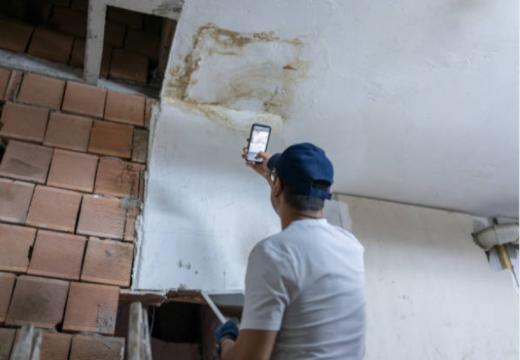How To Manage Rental Property Damage By Tenants In Ghana
How To Manage Rental Property Damage By Tenants In Ghana
- by PropHunt Admin
- On 18-06-2025
- at 1:34 PM

The one word landlords don’t want to hear when renting out a rental property in Ghana is damage. While it is something that is bound to happen, whether directly or indirectly through tenants, it remains one of the biggest fears for property owners when leasing their properties in Ghana.
However, the reality is that rental properties in Ghana cannot remain in the same condition forever; they will surely experience some damage one way or another, even with the best of tenants. In view of that, there is a clear difference between normal wear and tear and damage to property by the tenant.
In case there is damage to your rental property in Accra, perhaps the roofing develops some leakages, torn-up window glass, or any form of external damage, it can be difficult to determine who is responsible for repairs and costs. To provide clarity on this, we’ve created a step-by-step guide on how to manage damage to rental properties caused by tenants in Ghana.
Key Steps to Handle Rental Property Damage by Tenants
This step-by-step guide will make sure you understand exactly what to do and what your obligations are. Should there be a dispute, you’ll know exactly how to handle it, identify who is responsible, and safeguard your rental property from damage in the future.
1. Find out if it’s wear and tear or property damage
Don't just rush to conclude that the tenant is liable for any damage caused to the property rather, assess the situation to determine whether the damage is wear and tear or actual property damage. This will help you decide who is liable for repairs. So, what then is the difference between normal wear and tear and property damage?
Normal wear and tear is the natural deterioration that every real property is expected to go through over time. Usually, these damages are extremely difficult, if not impossible, to avoid over a long period. Therefore, as a landlord in Ghana, it would be unfair to expect tenants to cover the costs of repairs caused by wear and tear.
On the other side, if the rental property damage includes things like broken windows, broken locks, burns on countertops, and fire damage. Your tenant becomes responsible for costs, as these are instances of abuse or neglect of your rental property rather than fair wear and tear.
2. Identify who is responsible for repairs
In managing rental properties in Ghana, the general rule is that the person who causes rental property damage is usually the one who is responsible for repairs. However, it’s not always straightforward to determine who is responsible. This is where your lease agreement comes into play, it’s incredibly useful for avoiding or settling rental disputes over rental damage.
If your tenant in Accra is claiming that they are not responsible for particular damages, your next step will be to check the tenancy agreement conditions to see if the damage is included in the tenant's liabilities. The tenancy agreement should detail what is considered normal wear and tear and who is responsible, so when in doubt, you can refer to this.
In instances where the cause is not wear and tear damage but also found not to be damage caused by the tenant, hence the repairs become your responsibility as the landlord.
3. Organise a repair quickly
One thing that affects a retaining tenant is the landlord's inability to respond to a repair quickly. Once you have identified the type of damage caused and who is responsible, the next step is to organise a repair quickly. If the tenant offers to do it themselves, fine, but they should follow your conditions of repairs.
This ensures the repairs are completed to a satisfactory level and maintains the integrity of the property. It is advisable to document any such agreements in writing to avoid future misunderstandings. Regardless of who undertakes the repair, the landlord should maintain oversight to ensure the work is done correctly and on time.
4. Notify your tenant of repairs
Once you’ve organised repairs to be performed, you’ll need to notify your tenant, especially where you need access to the property. Whether the damage caused is urgent or not will dictate how much notice you need to give to your tenant. If it’s an urgent repair, you’ll have to give them at least 24 hours’ notice and have it fixed. Urgent repairs may include faulty locks, leaking roofs, and electrical malfunctions.
Non-urgent property repairs are a bit different and should be given at least two days' written notice but can be fixed within two weeks. These include things like a broken window and broken furniture.
If a tenant is unavailable, ensure they consent to property access for repairs. This step is crucial because any trespass on a rental property could land you in some serious legal trouble, as by law, you’re required to give prior notice before entering the property, regardless of the reason. Landlords in Ghana are legally obligated to provide notification before entering a rented property.
5. Verify repairs after completion
Verify that the damage caused by the tenant has been fixed properly. You have to follow up with the tenant in a few weeks to make sure the problem has been fully fixed. One way to make your tenant feel like their needs are being looked after is by promptly responding to maintenance and repairs. After all, every rental owner wishes for a happy, long-lasting tenant in Ghana.
If concerns about property damage persist after tenant repairs, a property inspection can be scheduled to confirm proper completion and the absence of new issues. However, keep in mind that the frequency of these inspections is limited annually, and adequate notice must be provided.
When a tenant is responsible for damages but refuses repairs
What steps can you take if you've determined that your tenants in Accra caused rental property damage and they are unwilling to take responsibility? When you find yourself in this situation, you can bring the case to the Rent Control Department, which will act as the mediator.
The Rent Control will be there to hold the tenant accountable if you’re able to prove the tenant is liable for rental property damage, for instance, by showing that they had breached the tenancy agreement or proving that the damage wasn’t there when they moved in.
Similarly, in the unfortunate situation of a tenant causing illegal or criminal damage to a property, you may need to take more serious action. Yes, we’re talking about suing tenants in Ghana for damages or even evicting them. But before you ask yourself how to evict tenants in Ghana, it is important to understand your rights and responsibilities when it comes to damage to property by the tenant in Ghana.
Both tenants and landlords have a legal duty to uphold in a tenancy agreement. If your tenant is causing damage to your property, breaching the agreement, or inflicting unreasonable maintenance issues, you are absolutely within your rights to evict them.
Final Thoughts
As we mentioned, rental property damage can occur even with the best of tenants in Ghana, but by taking pre-emptive steps and measures, you can safeguard your rental property in Accra from any further damage in the future.

 French
French




